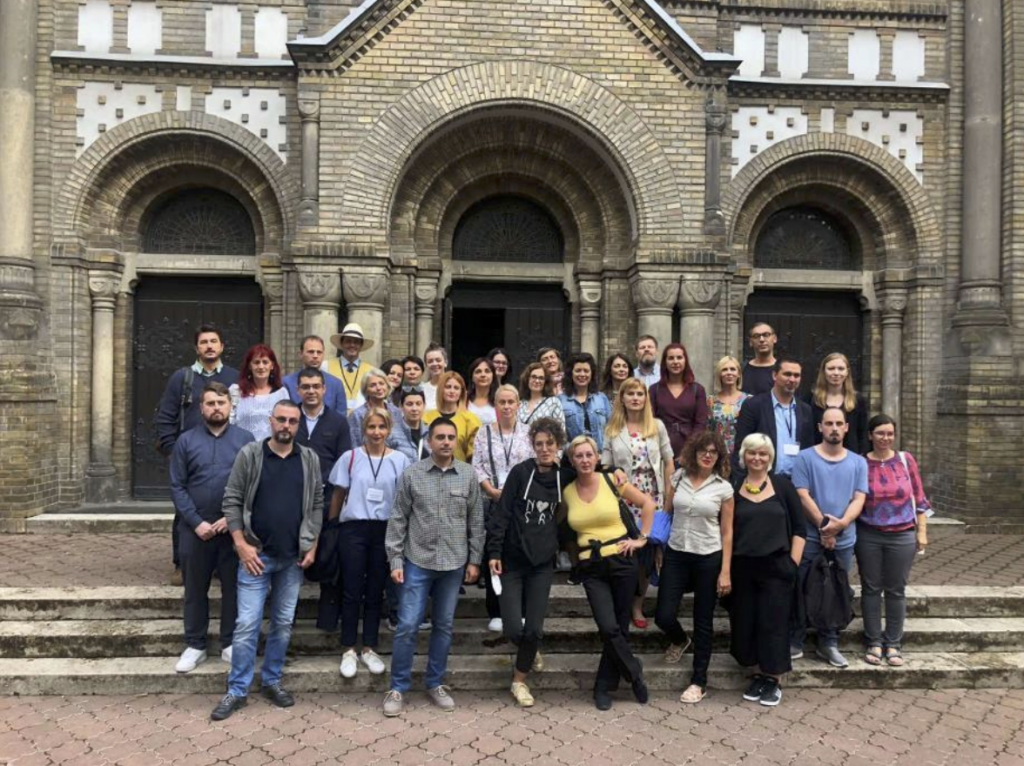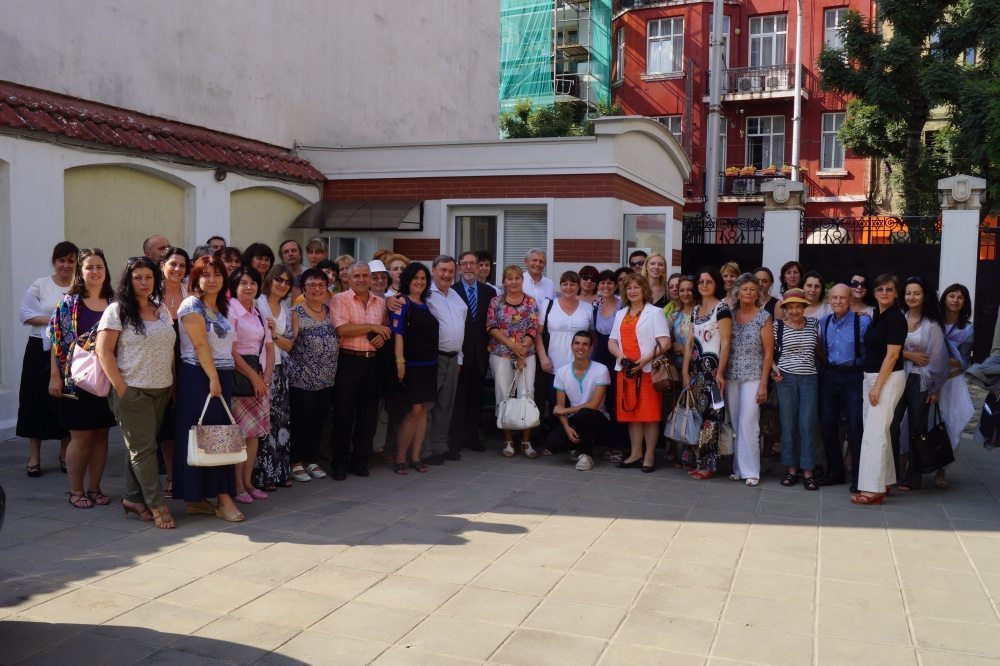
TOLI’s second seminar in Serbia, “Learning from the Past, Acting for the Future,” is organized in partnership with Terraforming. The seminar takes place in Novi Sad on August 22-26, 2022.
A group of 35 teachers from across the country will have the opportunity to deepen their knowledge about the Holocaust and to work together to find meaningful ways of bringing this important part of history to their students. The seminar will also address local histories, experiences and narratives, as well as present day human rights violations and discrimination.
The aim of the seminar is to contribute to increasing the quality of education regarding the Holocaust and social justice in Serbia. The program provides a rich opportunity to integrate national and international approaches in teaching about these topics and in understanding the contemporary relevance of this important part of modern history. The objectives of the program are to:
- Develop teachers’ awareness of historical and current dialectical discussions concerning the Holocaust and other instances of social injustice;
- Develop teachers’ understanding of the impact of stereotypes, prejudices and discrimination at individual, group and society level;
- Develop teachers’ understanding of the Jewish life before and after the Holocaust;
- Increase appreciation for innovative, student-centered teaching methods, including extra-curricular activities and partnerships between school and other institutions and organizations
- Promote an intersectional approach of Holocaust education and Human Rights education.
The seminar incorporates a methodology designed to ensure the basic principles of active participation and holistic learning throughout the program. The methodology is learner centered, based on the principles of experiential learning and a human rights-based approach in education. Special consideration is given to ensuring a balanced approach between cognitive and emotional elements and reflection time; balance between the information about the horrors of the Holocaust and information about the life of Jewish people before and after the Holocaust, for a more complex narrative; balance between reflection and action (learning is not enough, acting upon what was learned is the key to social change).
Following the seminar, teachers will receive support to put into practice what they learned and develop local
projects with their students, as well as to engage in international partnerships with teachers from other countries who attended TOLI seminars.
Graduates of the seminar are offered the opportunity to apply for impact grants to receive support for the projects on Holocaust education and social justice they plan to implement in the next school year. The grant consists of $300 and continuous advice and support in the implementation of the projects.
Lecturers
Nevena Bajalica is an Educator, co-founder of Terraforming, member of Serbian delegation to IHRA and member of the team of experts at the Anne Frank House in Amsterdam, the Nederlands.
Oana Bajka is the Associate Director of European Programs at The Olga Lengyel Institute. She has over 10 years of experience working with teachers, young people and people from minority communities, especially migrants and Roma, in intercultural education and community development projects. She is in charge of the TOLI Impact grants Program for European teachers, working with several hundred teachers who are graduates of TOLI seminars in Europe and qualify to apply for the annual impact grant program. She also works as Project Manager at the Intercultural Institute Timisoara.
Vuk Dautović is an art historian from Belgrade, working at the Department of Art History, Faculty of Philosophy, the University of Belgrade. He is a Ph.D. candidate at the same Department and his field of research includes the material culture of the early modern period and the visual culture of the Balkans. Vuk Dautović’s primary area of expertise is ecclesiastical art, first and foremost the liturgical objects and church utensils. Another area of his research is related to studies of Jewish visual culture and history in the Balkans, concerning the ceremonial art and different manifestation of Sephardic Jewish visual culture.
Petar Đurđev is a historian, high school teacher and head of the Historical Archives of the City of Novi Sad. His research focuses on the following topics: the history of Novi Sad, the history of the Šajkaška region and the history of sports in Novi Sad between First and Second World War.
Wolf Kaiser is a historian, he worked as a high school teacher and for 24 years as a historian and educator at the Memorial and Educational Site House of the Wannsee Conference in Berlin. Since 2001 he is a member of the German delegation to the IHRA.
Milan Koljanin is a historian, senior researcher at the Institute for Contemporary History in Belgrade, member of Serbian delegation to IHRA. His scientific research work is centered on the study of 5 repressive systems in World War Two in Yugoslavia, especially the establishment and functioning of the system of camps, the repressive legislature of the Independent State of Croatia, the Holocaust in Serbia and Yugoslavia, systemizing and using of historical sources regarding the Holocaust in Yugoslavia, especially in Serbia, the use of film as a means of propaganda, the use of anti-Semitic stereotypes in propaganda in Serbia, the history of the Jews and anti-Semitism in the Kingdom of Yugoslavia.
Gadi Luzzatto Voghera Ph.D. is a member of the Italian delegation in IHRA. He has been a professor of Jewish history at the Boston University study abroad program in Italy and at the Ca’ Foscari University in Venice for two decades. Among his works see Antisemitismo. Domande e Risposte (Feltrinelli, 1994), Il prezzo dell’eguaglianza (FrancoAngeli, 1998), Antisemitismo a sinistra (Einaudi, 2007), Rabbini (Laterza, 2011), No distinction of race or religion. Rotary in Italy, Jews, and the antisemitic persecution (1923-1938), (Erredi Grafiche editoriali, 2013), Antisemitismo (Editrice Bibliografica, 2018).
Oana Nestian Sandu is the International Program Director of The Olga Lengyel Institute. She has a Ph.D. in social psychology and a vast experience working as a teacher trainer in several European countries and in the United States. She is as an international expert in intercultural education and human rights education, having worked as a trainer and researcher for the Intercultural Institute of Timisoara and as a consultant for the Council of Europe and for the United Nations.
Sanja Petrović-Todosijević is a historian, researcher at the Institute for Recent History of Serbia, Belgrade. Her interest topics revolve around the social history of Serbia and Yugoslavia in the period after the Second World War, with special reference to the history of the Second World War. Her interests focus on the study of the Holocaust and other mass crimes, as well as the policies of the collaborationist administration on the territory of the German occupation zone in Serbia. She is one of the founders of the Center for Yugoslav Studies. She is an active member of the Initiative for the Renovation of the Boško Buha Memorial Complex.
Milovan Pisarri is a historian, founder of the Center for Applied History. He obtained his doctorate from the History Faculty of the University of Venice with a thesis on the suffering of the civilian population in the twentieth century with focus on the Holocaust and nationalism. He works at the Centre for Holocaust Research and Education in Belgrade. His 2014 study The Suffering of the Roma 6 in Serbia during the Holocaust (in English) is based on extensive archival research and makes a fundamental contribution to research on this topic.
Miško Stanišić is an educator, co-founder and director of Terraforming, member of Serbian delegation to IHRA, where he participates in the Education Working Group and the Committee on the Genocide of the Roma. At Terraforming, he develops educational methodologies and teaching materials related to teaching the Holocaust and human rights, combining best practices in contemporary pedagogy with new-media technologies. He is working particularly with setting up cross-sectoral international project cooperation and exchange programs between research institutions, universities, memorials and museums, archives, local communities, governmental bodies and independent actors. He gives workshops about media literacy, antisemitism, antigypsyism and other forms of xenophobia, and speaks about his experiences as a refugee from Yugoslav wars.
Marko Šuica is a historian, professor at the Department of History at the Faculty of Philosophy at the University of Belgrade, member of EuroClio’s Network in the Balkan Region. The main topics he deals with in his research relate to political and social phenomena related to the Serbian state and society at the end of the 14th century, especially in relations with the Ottoman Empire. He published the books The Troubled Age of the Serbian Middle Ages, Vuk Branković – a famous and noble gentleman, Milica – the Princess of the Troubled Age, as well as several textbooks, and scientific and professional papers in the country and abroad. Since 2001, he has been working to improve the teaching of history.
